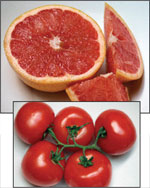Recent Findings in Prostate Cancer Research: Statins, Risk Factors, and Lycopene
Two studies published in early 2014 showed inconsistent findings relating to statin use and prostate cancer risk. Statins are drugs frequently used to reduce fat and cholesterol in the blood.
Statins, Prostate Cancer and Regular Screening
Researchers at Johns Hopkins studied statin use in 9,457 men age 55 years or older who were enrolled in the Prostate Cancer Prevention Trial. The men had low baseline PSAs and were screened for prostate cancer annually.
Over seven years of follow up, the study found that statin use was not associated with an overall risk of prostate cancer, nor with high- or low-risk prostate cancer. The authors concluded that their results did not support the hypothesis that statins protect against prostate cancer in the setting of regular prostate cancer screening.
Statin Use and Lower Risk of Prostate Cancer Death
An observational study of 11,722 men in the UK found an association between statin use after prostate cancer diagnosis and a decrease in all-cause and prostate cancer-related mortality.
In the study, men who used statins after their prostate cancer diagnosis had a 24% decrease in the risk of prostate cancer mortality and a 14% decrease in all-cause mortality. The men with the greatest risk reduction also used statins before being diagnosed with prostate cancer.
The authors said their study supports the experimental evidence suggesting statins have a potential antitumor effect on prostate cancer. Additional studies are necessary to confirm this.
Risk Factors for Adverse Pathology
A new study examined the risk factors of upgrading and upstaging among 13,159 Swedish men with Gleason 6 prostate cancer who were potential candidates for active surveillance. Of this group, 4,500 had radical prostatectomies.
Approximately 50% of these men had adverse pathology at radical prostatectomy. More than one third of men who met stringent active surveillance criteria had adverse pathology at radical prostatectomy. Adverse pathology was defined as upgrading to Gleason 7 or greater or upstaging to cancer that had spread beyond the prostate gland. Older age, higher PSA, higher PSA density (greater than 0.15 ng/ml/cm3), palpable disease (presence of a nodule) and extent of cancer greater than 4 mm on biopsy correlated with adverse pathology.
The authors concluded that active surveillance programs should consider a patient’s risk factors for adverse pathology.

Lycopene and Lower Risk of Lethal Prostate Cancer
A new epidemiologic study investigated the association between dietary lycopene intake and prostate cancer in 49,898 men.
Researchers found that higher lycopene intake was associated with lower incidences of overall prostate cancer and lethal prostate cancer. Higher lycopene intake was also associated with lesser degree of angiogenesis in the tumor. Angiogensis, the formation of new blood vessels, is a strong factor for the progression of prostate cancer.
Men in the study who ate the most lycopene were slightly younger and more likely to engage in vigorous physical activity. They also consumed less alcohol, coffee and fat and ate slightly more fruits, vegetables and fiber.
Based on their results, the authors hypothesized that a diet rich in foods containing lycopene reduces the aggressive potential of prostate cancer by inhibiting the angiogenesis that occurs in tumor development.
Platz E. et al. Statin Drug Use Is Not Associated with Prostate Cancer Risk in Men who are Regularly Screened. J Urol. 2014; doi:10.1016/j.juro.2014.01.095
Yu O. et al. Use of Statins and the Risk of Death in Patients with Prostate Cancer. J Clin Oncol. 2014; 32(1):5-11.
Vellekoop A. et al. Population Based Study of Predictors of Adverse Pathology among Candidates for Active Surveillance with Gleason 6 Prostate Cancer. J Urol. 2014; 191(2):350-357.
Zu K. et al. Dietary Lycopene, Angiogenesis, and Prostate Cancer: A Prospective Study in the Prostate-Specific Antigen Era. J Natl Cancer Inst. 2014; 106(2):djt430













